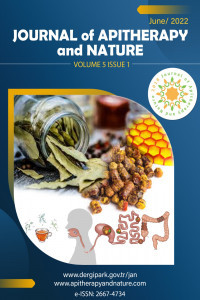Preliminary Studies: The Potential Anti-Angiogenic Activities of Two Sulavesi Island (Indonesia) Propolis and Their Chemical Characterization
Preliminary Studies: The Potential Anti-Angiogenic Activities of Two Sulavesi Island (Indonesia) Propolis and Their Chemical Characterization
Anti-Angiogenic Activities, Propolis,
___
- 1. Daleprane JB and Abdalla DS (2013) Emerging roles of propolis: antioxidant, cardioprotective, and antiangiogenic actions. Evid Based Complement Alternat Med, 2013:175135.
- 2. Raza A, Franklin MJ, and Dudek AZ (2010) Pericytes and vessel maturation during tumor angiogenesis and metastasis. Am J Hematol 85(8):593-8.
- 3. Hayakawa Y, Saito J, Izawa M, and Shin-ya K (2014) Actinopyrone D, a new downregulator of the molecular chaperone GRP78 from Streptomyces sp. J Antibiotics 67: 831–834
- Yayın Aralığı: Yılda 2 Sayı
- Başlangıç: 2018
- Yayıncı: Oktay YILDIZ
Emerging Impact of Bee Propolis for Gut Health: Evidence and Mechanisms
Kai WANG, Xiaolu JIN, Qiangqiang LI, Alexandra Christine Helena Frankland SAWAYA, Richard K. Le LEU, LEU4, Michael A. CONLON, Liming WU, Fuliang HU
Chemical Profiling of Papua New Guinea Propolis and Assay its Antiprotozoal Activity
Samya ALENEZI, Naif Alenezi MANAL, J NATTO, Harry P. De KONING, John IGOLI, David G. WATSON
Antituberculosis Activity of Propolis
Jarosław WIDELSKI, Joanna GOLUS, Piotr OKIŃCZYC, Rafał SAWICKI, Grażyna GINALSKA, Tomasz MROCZEK, Zuriyadda SAKIPOVA, İoanna CHINOU, Krystyna SKALICKA-WOŹNIAK
Zaccaria VINCENZO, Galeotti FABIO, Fachini ALFREDO, Passarella PAOLO, Daglia MARIA, Volpi NICOLA
Chemical Profile of Greek Arbutus unedo Honey – Biological Properties
αrgyrο ANDREOU, Ioanna CHINOU, Konstantia GRAIKOU
The Efficacy of Propolis Fluoride in Inhibiting Dental Caries Activity on Primary Teeth
Risqa Rina DARWITA, Iwany AMALLIAH, Sri Angky SOEKANTO, Muhamad SAHLAN
Preliminary Evaluation of the Cytotoxic Potential of North-West Romanian Propolis
Constantin İ. MATES, Emoke PALL, Marina SPINU, Laura STAN, Mihaela NICULAE
Fatty Acid Analysis and Biological Activity of Jordanian Propolis
Ashok K. SHAKYA, Shankar KATEKHAYE, Ghaleb A. ORIQUAT, Rajashri R. NAIK, Rajashri R. NAIK, Anant PARADKAR, Hugo FEARNLEY, James FEARNLEY
Hugo ALVES, Catarina PASSÃO, Maria João SOUSA, Cristina Almeida AGUIAR, Ana CUNHA, Rui Pedro OLIVEIRA
